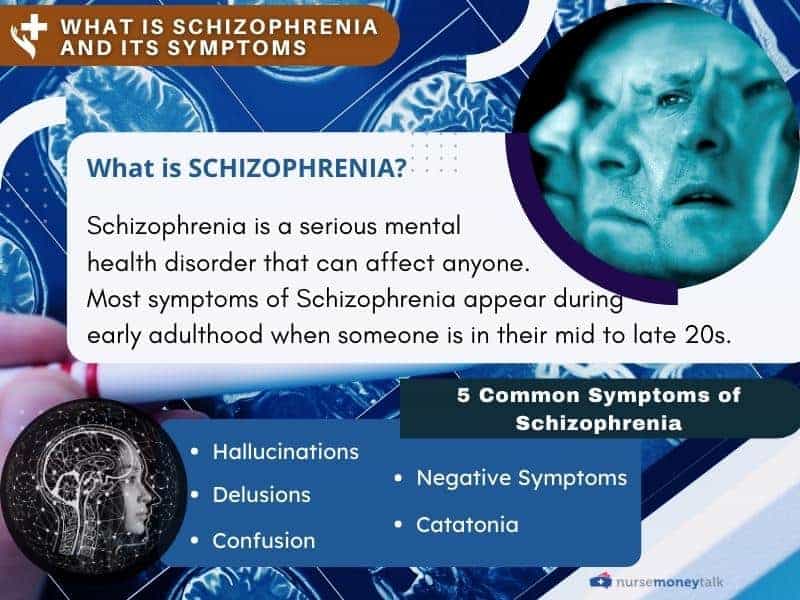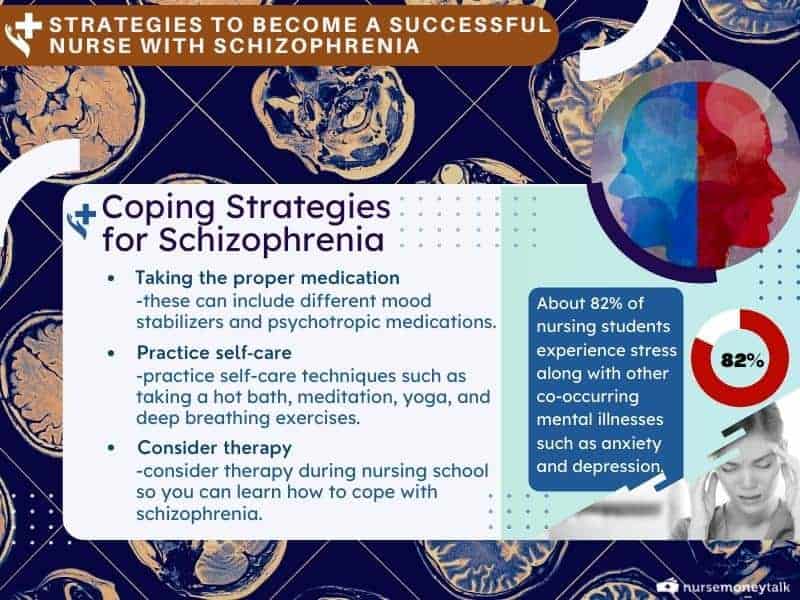Becoming a nurse and working in healthcare can be a dream come true for many people.
But, what about those living with severe medical or mental health conditions such as Schizophrenia?
Will they ever be able to practice as a nurse or other medical professional?
Can You Become a Nurse with Schizophrenia?
It’s possible to become a nurse and to work as a nurse with a medical or mental health illness like Schizophrenia. It all depends on the medication treatment plan you’re under, how well under control your Schizophrenia is, and your level of comfort working with your condition.
What is Schizophrenia?

Schizophrenia is a severe mental health disorder that can affect anyone during their adult lifetime.
Most symptoms of Schizophrenia appear during early adulthood when someone is in their mid to late 20s.
This means you could be a nursing student or even already working as a nurse before you begin to notice symptoms of this disorder.
Schizophrenia Symptoms to look out for include:
- Hallucinations: Can be visual or auditory. This can include voices commanding you to perform certain tasks or seeing things that aren’t there.
- Delusions: This can be believing someone on the TV or radio has a message specifically for you. Or believing you are incredibly important (this is also known as delusions of grandeur). You might also have increased paranoia as part of your delusions.
- Confusion: This can also be an inability to organize your thoughts or think clearly.
- Negative symptoms: These are symptoms of Schizophrenia that cause you to have a flat affect. These include being mute, having a monotone voice, or remaining expressionless. Although these symptoms might appear to be depression, they are much more pronounced and severe in someone with Schizophrenia.
- Catatonia: In catatonic Schizophrenia, it causes a person to essentially freeze and be unwilling to move or be moved.
Can Nursing Make Schizophrenia Worse?
Schizophrenia symptoms do have a tendency to flare up in times of stress.
In addition, studies have shown that people with Schizophrenia have a different stress response than those without Schizophrenia.
This means they produce different amounts of cortisol and dopamine levels in their brain in response to stress.
What does this mean for nurses?

For starters, it’s no secret that nursing school is incredibly stressful. I
n fact, a little over 82% of nursing students experience stress along with other co-occurring mental illnesses such as anxiety and depression.
It’s important to consider how stress will play a role in nursing school and if it will play a role when you become a nurse.
Unfortunately, nursing can be an incredibly stressful job, where you have the lives of other patients on your hands.
To be successful as a nurse with Schizophrenia and not allow stress to impact you negatively, consider the following:
Related: 10 Most Stressful Nursing Jobs
1. Taking the Proper Medication
There are various treatment options for people with Schizophrenia, but all include taking medications.
These can include different mood stabilizers and psychotropic medications.
It’s important to talk to your doctor or psychiatrist about your medications and continue to take them regardless of whether or not you “feel better.”
Taking your medication might help you get through the stress of the day when working as a nurse.
2. Practice Self-care
Whether you’re a nurse, an office worker, or a stay-at-home parent, self-care is always a critical component of stress reduction.
Practice self-care techniques such as taking a hot bath, meditation, yoga, and deep breathing exercises.
3. Consider Therapy
People with Schizophrenia can benefit immensely from different types of therapy, including cognitive-behavioral therapy, family intervention, training programs, and much more.
Consider taking therapy during nursing school or after starting your nursing career so you can learn how to cope with your Schizophrenia.
In addition to the steps above, you can also consider working on the administrative side of nursing.
As a nursing admin, you’ll still play an essential role in keeping your hospital employees and patients safe. However, you’re doing it in another capacity and not providing direct patient care (which can be stressful).
To work on the administrative side of nursing, you’ll more than likely need a master’s or doctorate degree in nursing. Although this schooling might be difficult, it is well worth it!
What if I Have a Relapse in Symptoms?

If your Schizophrenia is under control with medications and therapy, you can successfully work in any job or field you love, including nursing.
However, there is always a risk of relapse in which your symptoms might return, or your medication stops working.
If this is the case, don’t worry. Under federal and state law, it is illegal for you to be fired due to a medical or mental health condition such as Schizophrenia.
Even if you often find yourself struggling to keep your symptoms at bay and need extra time off work, you can do so by requesting FMLA leave, so-called for the Family and Medical Leave Act.
This act allows you to take time off work to address your mental or medical issues, spend time with a sick loved one, and protect yourself from being fired due to your condition.
Fortunately, even if you have a relapse that requires hospitalization, the average length of your hospitalization stay is around 10 days.
This means that your doctors will be able to adjust your medication and stabilize you so you can get back to doing what you love.
Dream Big
Did you know famous celebrities such as comedian Darrell Hammond and Fleetwood Mac guitarist Peter Green also had Schizophrenia?
If they can be successful and live their lives with Schizophrenia, so can you!
Using the proper treatment and following your doctor’s advice can help you learn to live with this mental disorder while also helping others in your career as a nurse.
If you’re ready to start, check out our website to find your next nursing school or nursing job!
Have You Read These Yet?
Related articles to “can you become a nurse if you have schizophrenia?”
- Can You Become a Nurse with a Felony?
- Can You Be a Nurse with a Health Science Degree?
- Can I Become a Nurse with a Degree in Kinesiology?
- Engineering vs Nursing: Which One Should I Pick?


Go to school and do everything you are going to do